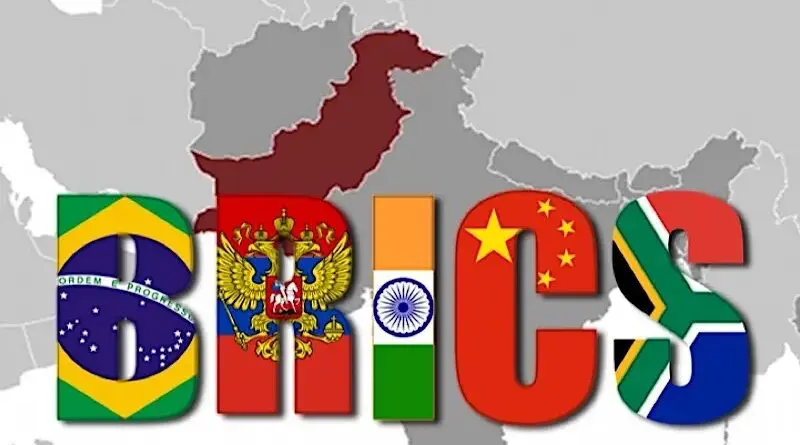Pakistan’s Strategic Investment in BRICS

Pakistan’s decision to invest $582 million in the BRICS-backed New Development Bank (NDB) marks a transformative shift in its economic strategy. By securing a 1.1% stake in the NDB, Pakistan aims to diversify its financial options, reduce dependency on Western financial institutions, and solidify its position in global economic governance. This strategic maneuver not only enhances Pakistan’s fiscal autonomy but also strengthens its economic ties with BRICS nations, Brazil, Russia, India, China, and South Africa. As the country seeks to navigate the complexities of global finance, this move signals a commitment to sustainable development and financial sovereignty.
The International Monetary Fund (IMF) and the World Bank have long been the primary sources of financial assistance for Pakistan. However, their funding often comes with stringent conditions, including policy directives that impact national economic decision-making. By investing in the NDB, Pakistan secures access to an alternative financial institution that offers flexible financing without excessive policy constraints. This approach ensures that the country can pursue infrastructure, energy, and development projects without the traditional external pressures associated with Western lenders.
Founded in 2015, the New Development Bank was established to serve as an alternative to Western-dominated financial institutions. The NDB provides project-based financing with competitive interest rates and fewer conditions, making it an attractive option for emerging economies. Pakistan’s stake in the NDB strengthens its influence in global financial decision-making and aligns with its broader economic resilience goals. By becoming a shareholder, Pakistan gains access to development funding that supports its long-term economic growth and stability.
One of the primary benefits of this investment is the diversification of Pakistan’s financial portfolio. Over-reliance on a single group of lenders has historically subjected the country to economic volatility. By incorporating the NDB into its financial framework, Pakistan reduces its exposure to financial shocks and external debt vulnerabilities. This step aligns with the government’s vision of fiscal autonomy, enabling the implementation of economic policies that prioritize national interests over external influences.
Infrastructure development is a key area where NDB financing can make a significant impact. Pakistan’s ongoing infrastructure projects require substantial capital investment, and NDB’s funding will help bridge the financing gap. This investment will be particularly beneficial for energy projects, which are crucial for addressing Pakistan’s power shortages and boosting industrial growth. The NDB’s focus on sustainable development financing also aligns with Pakistan’s climate resilience and green energy ambitions, ensuring that future infrastructure projects incorporate environmental considerations.
Beyond financing benefits, Pakistan’s NDB membership enhances its global economic standing. Strengthening economic ties with BRICS nations presents new opportunities for trade, investment, and financial collaboration. China, a key member of BRICS and Pakistan’s long-term ally, has already played a pivotal role in infrastructure projects under the China-Pakistan Economic Corridor (CPEC). Increased cooperation with other BRICS members, such as Russia and Brazil, could further enhance Pakistan’s economic landscape, fostering regional cooperation and mutual economic growth.
Another critical advantage of NDB membership is its potential to improve investor confidence in Pakistan. Economic instability and external debt concerns have historically deterred foreign investment. By securing an alternative funding source, Pakistan demonstrates its proactive approach to financial stability and growth. A diversified financial strategy reassures investors that the country is taking tangible steps toward fiscal responsibility and economic resilience.
In addition to reducing external debt burdens, Pakistan’s participation in the NDB allows for the implementation of self-reliant economic policies. The flexibility of NDB financing means that Pakistan can initiate development projects without the restrictive conditions often imposed by Western institutions. This autonomy enables the government to prioritize national interests while formulating economic reforms that foster long-term stability.
Pakistan’s strategic investment in the NDB also opens doors for knowledge exchange and expertise sharing with other member countries. The NDB provides a platform for best practices in infrastructure development, financial management, and sustainable growth. By engaging with experienced financial institutions and policymakers from BRICS nations, Pakistan can enhance its economic governance and decision-making capabilities.
While the benefits of NDB membership are substantial, challenges remain. Pakistan must effectively manage its investment to maximize returns and ensure that NDB-funded projects align with national priorities. Additionally, as a relatively new financial institution, the NDB is still in the process of expanding its global influence. Pakistan must actively engage in NDB decision-making processes to ensure that its interests are represented and safeguarded.







